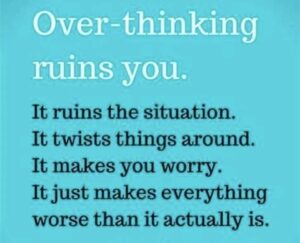 What exactly is the meaning of ‘overthinking’, and why do some individuals find themselves trapped in this mental labyrinth?
What exactly is the meaning of ‘overthinking’, and why do some individuals find themselves trapped in this mental labyrinth?
We live in a world that demands constant planning and forward-thinking, the overthinker often finds themselves caught in a perpetual cycle of analyzing every detail, contemplating every possible outcome, and meticulously planning for the future. This article delves into the intricacies of overthinking, exploring its roots, and consequences, and providing insights on breaking free from its grasp.
THE ANATOMY OF OVERTHINKING: 
Overthinking, at its core, is an incessant focus on the past, present, and future. Individuals who identify as overthinkers may feel compelled to analyze every decision, rehearse conversations in their minds, and strategize for various scenarios that may or may not come to fruition. This tendency often leads to heightened anxiety, stress, and an overwhelming sense of mental fatigue.
 THE ORIGINS OF OVERTHINKING: While childhood trauma can certainly contribute to overthinking tendencies, it is essential to recognize that not all overthinkers are survivors of abuse. Overthinking can stem from various sources, such as societal pressure, perfectionism, or an inherent need for control. Understanding the root cause is crucial for developing effective coping mechanisms.
THE ORIGINS OF OVERTHINKING: While childhood trauma can certainly contribute to overthinking tendencies, it is essential to recognize that not all overthinkers are survivors of abuse. Overthinking can stem from various sources, such as societal pressure, perfectionism, or an inherent need for control. Understanding the root cause is crucial for developing effective coping mechanisms.
 OVERTHINKING AND CHILDHOOD TRAUMA: For those who have experienced childhood trauma, the echoes of the past can reverberate into adulthood, influencing patterns of thought and behavior. Some survivors of abuse may find themselves attracted to toxic or narcissistic individuals, perpetuating a cycle of mistreatment, albeit on different levels. However, it’s crucial to approach each case individually and not generalize the experiences of abuse survivors.
OVERTHINKING AND CHILDHOOD TRAUMA: For those who have experienced childhood trauma, the echoes of the past can reverberate into adulthood, influencing patterns of thought and behavior. Some survivors of abuse may find themselves attracted to toxic or narcissistic individuals, perpetuating a cycle of mistreatment, albeit on different levels. However, it’s crucial to approach each case individually and not generalize the experiences of abuse survivors.
 THE HARMFUL IMPACT OF OVERTHINKING ON THE PSYCHE: Overthinking can wreak havoc on mental well-being. Constantly living in the future or dwelling on the past prevents individuals from fully experiencing the present. This persistent state of mental unrest can lead to anxiety disorders, depression, and a diminished overall quality of life.
THE HARMFUL IMPACT OF OVERTHINKING ON THE PSYCHE: Overthinking can wreak havoc on mental well-being. Constantly living in the future or dwelling on the past prevents individuals from fully experiencing the present. This persistent state of mental unrest can lead to anxiety disorders, depression, and a diminished overall quality of life.
OVERCOMING OVERTHINKING:
Breaking the chains of overthinking requires a shift in mindset and the cultivation of mindfulness. Embracing the concept of living in the present moment can be a powerful antidote to the harmful effects of overthinking. Here are some strategies for overthinkers to consider:
- Practice Mindfulness Meditation: Engage in mindfulness
 meditation to train the mind to focus on the present moment without judgment.
meditation to train the mind to focus on the present moment without judgment. - Set Realistic Goals: Establish achievable short-term goals instead of overwhelming yourself with grand, distant objectives.
- Challenge Negative Thoughts: Actively challenge and reframe negative thoughts. Ask yourself if your concerns are based on facts or assumptions.
 Seek Professional Support: A therapist or counselor can provide valuable insights and coping mechanisms for managing overthinking tendencies.
Seek Professional Support: A therapist or counselor can provide valuable insights and coping mechanisms for managing overthinking tendencies.
Overthinking, though pervasive in today’s fast-paced world, doesn’t  have to be a lifelong sentence. By understanding the roots of overthinking, acknowledging its harmful impact, and actively pursuing mindfulness, individuals can break free from the shackles of constant mental turmoil. Embracing a one-thought-at-a-time approach allows overthinkers to reclaim their mental well-being and live a more fulfilling, present-focused life.
have to be a lifelong sentence. By understanding the roots of overthinking, acknowledging its harmful impact, and actively pursuing mindfulness, individuals can break free from the shackles of constant mental turmoil. Embracing a one-thought-at-a-time approach allows overthinkers to reclaim their mental well-being and live a more fulfilling, present-focused life.
